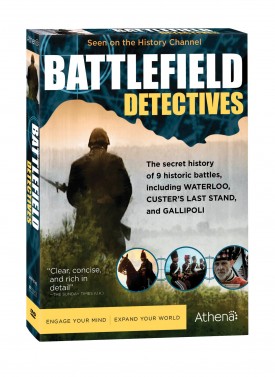‘Battlefield Detectives’ turns a microscope on British military power

The plethora of “historical investigation” series can be daunting to the casual viewer. The History Channel and its network sisters are devoted to looking back in time with a skeptical modern eye. For the most part, many of these investigations are for purely entertainment purposes, lassoing historical figures or time periods and treating them like a bestselling novel.
Battlefield Detectives, a nine-episode series seen on The History Channel a few years ago, is that rare exception to the rule. These in-depth looks into British battles by land and by sea are steeped in smart research and thoughtful criticism; it’s actually one of the most engaging educational programs to hit the airwaves in some time.
Each episode runs approximately 50 minutes, and they are almost always interesting and informative. Because this is a British series (now available on DVD from Acorn Media, the masters of British TV), many of the battles are probably obscure to American audiences. Whether it’s the Battle of Hastings or Agincourt, Battlefield Detectives doesn’t take the similar route of so many other “historical investigation” series and look solely at the goings-on of Hitler and the late 20th century. More time is spent on early watershed battles at sea, many of them set against the backdrop of the English Channel.
What sets the series apart is that the researchers for each episode are able to provide sound, accurate analysis on these historic wars that took place sometimes hundreds of years before. Some common techniques emerge: By looking at the caked soil on the battleground, researchers can get an idea of how the land has changed. Meteorologists are employed to figure out the types of weather conditions a fleet of ships might have faced. Other times, the researchers simply go to the battlefield and scope out the land, taking into account any slopes, hills or nearby rivers.
One of the best episodes is titled “Agincourt’s Dark Secrets,” when the researchers try to dispel the rumor that British arrows penetrated the armor of French soldiers, and thus won the deadly Battle of Agincourt. Amazingly, the military experts deduce that the French armor would have protected the soldiers from the English bodkin point. This means something else must be found to see how the British won.
The show is heavily based on science and military skill, but it allows some discussion on pure luck. No matter the weather, armor, ammo or manpower, occasionally a great leader can out-lead his counterpart on the battlefield. Sometimes the most obvious variable is the closest one to the truth: There are good military commanders, and there are bad ones.
Battles included in Acorn Media’s three-disc set include: Hastings, Agincourt, the sinking of the Spanish Armada, Trafalgar, Waterloo, Balaklava, Little Bighorn, Gallipoli and Vietnam.
Showing how fast technology can move, this series, which aired in the mid 2000s, feels a little dated. Some of the images and diagrams are from computers that the researchers would probably balk at today. But still, despite the advancements in the intervening years, the science behind Battlefield Detectives holds up well. This is not flashy, in-your-face entertainment that uses historical figures like characters from a Dan Brown novel. It’s much more methodical, and much more interesting. It proves that of all the tools available for the researchers, nothing is more effective than the power of hindsight.
By John Soltes / Publisher / John@HollywoodSoapbox.com
-
Battlefield Detectives
-
9 episodes on 3 discs
-
Running time: 432 minutes
-
Not Rated
-
Rating:




